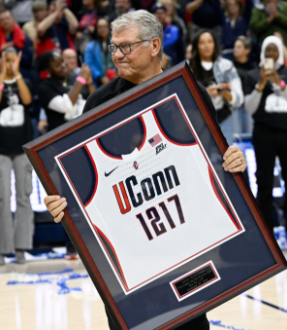
November 20, 2024 is a day which will go down in college basketball history forever. Geno Auriemma, head coach of the UConn Huskies women’s basketball team of forty years, put one final accomplishment on his long and stacked resume that solidified himself in college basketball lore forever and as not just one of the greatest coaches ever, let alone in basketball. Auriemma’s forty year reign of excellence allowed him to see all levels of monumental success completely unmatched by practically any coach ever, involving a list of records, awards, and achievements that spans pages. Auriemma also got to watch firsthand as women’s basketball, the game he pursued excellence in for decades, has revolutionized and popularized drastically. However, Auriemma took a long road of trials and tribulations to reach this point.
Luigi “Geno” Auriemma was born in Montella, Italy in 1954, and immigrated to the United States at the age of seven. It was during his time acclimating to his new home in the U.S that he fell in love with basketball,and aspired to make a living in basketball, ideally as a player. Despite having a very good high school career, Auriemma was never truly good enough to play basketball collegiately, let alone professionally. He slowly rose the ranks while coaching boys basketball in small colleges near his hometown of Norristown, Pennsylvania in the late 1970s. In 1981, Auriemma was offered a job as an assistant coach of the University of Virginia girls basketball team. Despite never imagining himself in women’s basketball, Auriemma decided to take up the offer, wanting to be involved in basketball within a big name college like Virginia. Auriemma played a moderate role as the Virginia Cavaliers would be a very respectable team and consistently being ranked as one of the top 25 women’s basketball teams in the nation. After four good years at Virginia, Auriemma would be presented what he did not yet know would be the opportunity that would change his life forever.
In 1985, Auriemma was asked by the at the time University of Connecticut Athletic Director John Toner to interview for the head coach position on the UConn Huskies women’s basketball team. The decision to hire Auriemma was part of the university’s commitment to better fund women’s sports. Auriemma’s was the final interview scheduled in the search for staff. Most of the other candidates were highly qualified, and most were female. One of those included in the interview process was Chris Dailey, who would become Auriemma’s assistant that same year as the two have worked side by side with one another for forty years. Prior to Auriemma’s arrival in 1985, the Huskies had posted only one winning season in its twelve year history. Women’s basketball at the time, like all of women’s sports back then, was practically nonexistent to the public, as no one watched or cared about women’s basketball. The horrible performance of the program at UConn made this bad situation worse, as when Auriemma first arrived to coach the Huskies, the team would ask other students at UConn to attend the games for free, and the program was operating at such a loss that Auriemma did not even have his own office for his first few years as head coach. He knew that change to the entire program was urgently needed, and Auriemma would vigorously deliver this change, allowing nothing to stand in his way.
Auriemma had an immediate impact, and introduced a tenacity and pursuit of physical and mental toughness that the once drained and diminished Huskies were in dire need of. Auriemma implemented a motion-oriented offense which consisted of driving down the lane, swinging the ball, on-ball screens, off-ball screens, and overall creating an opening to find the open player. This simple yet effective offense, with the virtues preached by Auriemma, all beside an aggressive and physical man-to-man defense that the Huskies were finally having demanded of them delivered an immediate turnaround to UConn. Auriemma not only brought change to the morale, intangibles, and strategy of his team, but these changes immediately translated to the scoreboard. In Auriemma’s second season coaching the Huskies in 1987, UConn finally had a winning season. In Auriemma’s fourth season, the Huskies would make the NCAA tournament for the first time, and in his sixth season in 1991, the Huskies made the Final Four. This turnaround would be one of the largest and most dramatic ever seen in sports. This upward spiral would not stop here though, as after a few very hard fought NCAA tournaments against other longtime powerhouses, the up-and-coming Huskies would no longer be content just making it far in the NCAA tournament, but went an incredibly unprecedented 35-0 undefeated season to win the 1995 NCAA women’s basketball championship over rival Tennessee 70-64. Auriemma coordinated an intricate process that spanned a decade, to take one of the worst college basketball programs in the nation and make them national champions.
Auriemma and the Huskies never looked back, and for the next three decades Auriemma would lead the longest and arguably the most dominant dynasty to ever exist in sports. After having to coach lesser-known players unwanted by the then best teams in the nation for his first ten seasons as coach while still reaching massive success, Auriemma transformed UConn into one of the most desired colleges for female basketball players. Now that he was also equipped with many of the best female players in the nation eager to be a Husky, UConn was seemingly unstoppable, demolishing nearly every team they would face. Over the past forty years still coaching the Huskies, Auriemma has not only solidified himself as the greatest basketball coach of all time, but as arguably the greatest coach in the history of sports overall. His records include eleven national championships, six in undefeated seasons, 23 Final Four appearances, 27 conference championships, 8x Naismith Basketball Coach of the Year, 9x AP Coach of the Year, 3x Olympic Gold Medalist coach, he is in the Naismith Memorial Basketball Hall of Fame, a win percentage of 88.3%, won 111 games in a row, and won 1,083 games without consecutive losses.

During Auriemma’s four decade tenure as the Huskies’ coach, women’s basketball was transformed from something that absolutely nobody watched into something that has become more popular and advertised than ever. This can be primarily attributed to the complete powerhouse Auriemma created at UConn, where any basketball fan either wanted to witness this high level of dominance and success or at least acknowledged and heavily respected it, leading to more attention towards women’s basketball in general. This can be specifically emphasized for young women and girls who could finally have something popular to look up to in basketball for themselves. This is especially true in Connecticut and New England as a whole, as UConn’s women’s basketball team sells more tickets and makes more money than any other women’s sports team nearly every year, creating a very large and strong fan base. One of these fans is beloved DHS math teacher of eleven years Todd Harris. “Moving to Connecticut made me a UConn fan…living in a house with two women made me a women’s basketball fan,” he explained. Fans got to witness Auriemma coach many of the greatest female basketball players in the world who were eager to play for UConn, including 13 All-Americans such as Rebecca Lobo, Jennifer Rizzotti, Nykesha Sales, Sue Bird, Diana Taurasi, Tina Charles, and Maya Moore. “He understands the game, obviously he understands the women’s game specifically…gets people to listen to him, obviously he gets the best players,” Harris stated.
At the age of 70, early on in his fortieth season coaching the Huskies, Auriemma and his Huskies would face Fairleigh Dickinson Knights on November 20, 2024. When the final buzzer went off, Auriemma claimed practically the only record in college basketball, mens or womens, that was not his own, and became the winningest coach after officially earning his 1,217th victory. It would be in an 85-41 blowout that was basically already over by halftime, normal for UConn standards. Auriemma put one final accomplishment on his long and storied resume that solidified himself in college basketball lore forever and as not just one of the greatest basketball coaches ever, but in the entirety of sports itself. This was a very emotional day for anyone who ever had anything to do with the UConn Huskies women’s basketball program, from both current and former players, to assistant coaches, to family of players, and of course to all of the fans watching both at the game and at home. “I was very happy that my wife and daughter were there to witness it,” Harris resonated. This can especially be said for those who have seen the program change from something no one knew nor cared about into one of the greatest dynasties sports has ever seen. Yet absolutely no one has seen this change on the level of and be as emotional as Geno Auriemma himself.

Looking ahead the remainder of the Huskies’ season, they are currently 11-1. Led by senior superstar point guard Paige Bueckers and freshman power forward Sarah Strong, the Huskies had dominant wins over other highly ranked teams, such as Ole Miss, Iowa State, and North Carolina. UConn is currently ranked fourth in the nation after dropping slightly in the rankings after their only loss in a 79-68 upset against eighth ranked Notre Dame on December 12. The Huskies will face many other elite teams this regular season, including seventh ranked USC, and second ranked longtime rival, South Carolina. Of course, things will begin to matter most for UConn once March Madness comes around once again, where they will try to survive and advance as 64 very respectable teams will all clash to be the 2025 national champions. The Huskies are very accustomed to big games down the stretch of March Madness, leaving Huskies fans to wonder just how great they will perform later in the tournament. But for now, let us cheer for the UConn Huskies for the rest of their season and hope that the legendary Geno Auriemma can win what could be his championship number twelve.






















